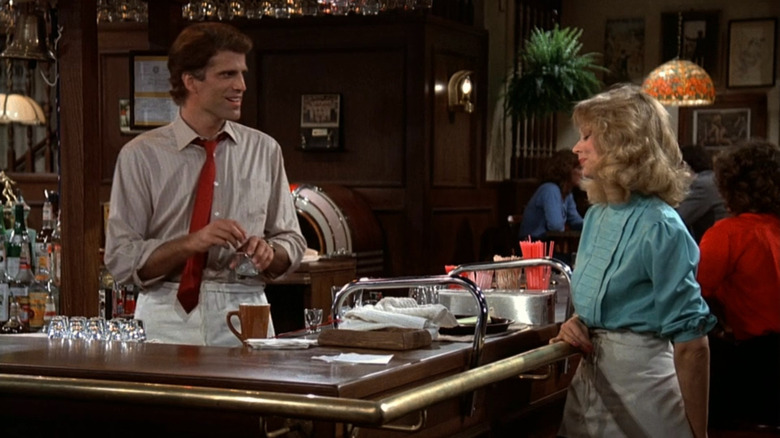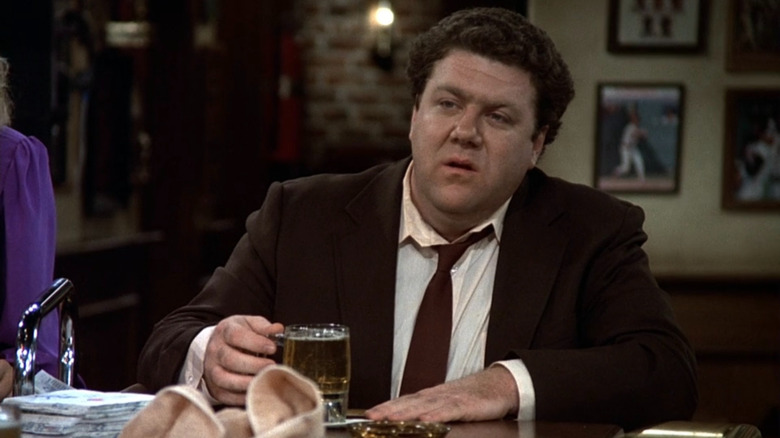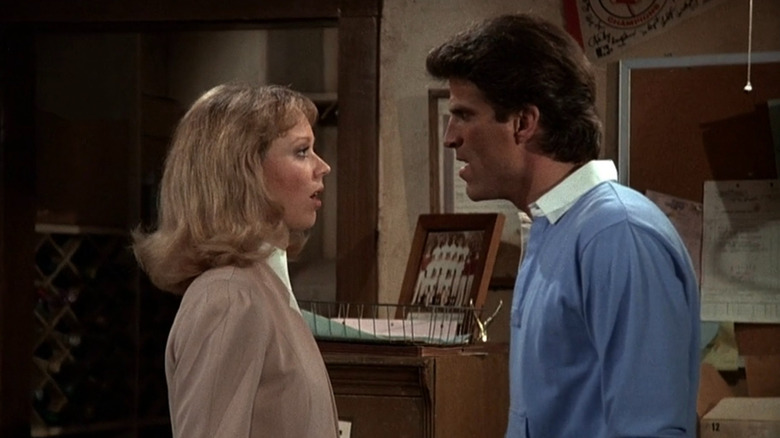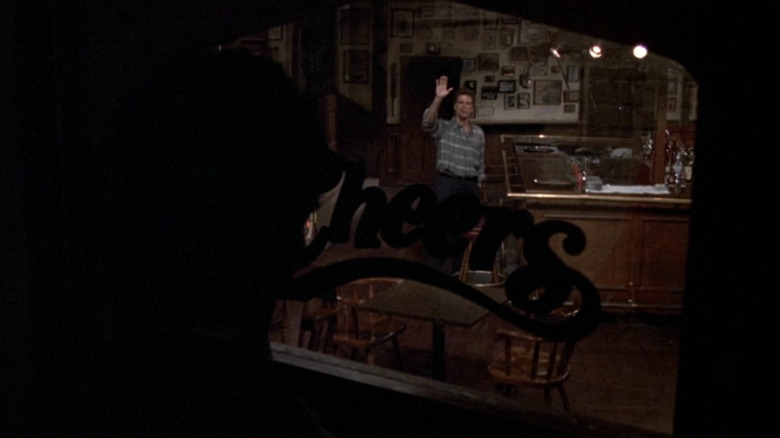Cheers Almost Crashed And Burned With Its Very First Season
"Cheers" went off the air on May 20, 1993, with a series finale that was watched by 93 million people. That was about two and a half months before I was born, so I have gone my entire life knowing what a cultural behemoth the show was. However, it took me a good deal of time to actually sit down and watch "Cheers." Growing up, my sitcom of choice was the one that took over the spot vacated by "Cheers" to become NBC's comedy crown jewel, "Seinfeld."
My relationship with the place where everybody knows your name didn't start until five years ago when I moved to a new city where I didn't know anyone. I had no furniture outside of a couch because there was a delay with the movers who helped me move halfway across the country. So, I had my laptop, an upside down cardboard box, a couch, and a lot of time on my hands. In that state, I started "Cheers," and it was exactly the balm I needed.
Right from the very first episode, I was completely hooked into the world of the show, the perfectly colorful characters, and the "will they/won't they" of Ted Danson's Sam and Shelley Long's Diane. TV shows, especially sitcoms, rarely have everything in order that early on, but "Cheers" delivered on every single level. That continued on for the entirety of the first season, which I found to be one of the most satisfying seasons of network television I'd ever seen. I completely understood why the show was such a massive deal. Come to find out, "Cheers" didn't begin as the behemoth I've known it to be. In fact, that first season that hooked me so, by most people's metrics, should have been canceled for its lackluster ratings.
So-Called 'Must See TV'
When "Cheers" premiered on September 30, 1982, at 9:00 PM, it was positioned as the lead-in to "Taxi," making its debut on NBC after four seasons on ABC, for NBC's Thursday night "Must See TV" programming block. Considering ABC canceled "Taxi" due to dwindling ratings, being the show to air before that season premiere was not the ideal spot for "Cheers" to be in. It didn't help that, at the time, NBC was firmly in last place amongst the three networks. The week of both shows' airings, there were 63 programs played in primetime. The fifth season premiere of "Taxi" ranked 56 that week, and "Cheers" entered the world at 60 with a 9.6 rating, estimating it at a bit below 8 million households. While people in today's TV landscape would kill for that number, that was abysmal in 1982.
The ratings never got much better, and identifying "Taxi" as a major issue in its "Must See TV" program, NBC punted the show to Saturdays at 9:30 PM, signaling an imminent death. "Cheers" was moved into the vacated spot, and the ratings improved, if ever so slightly. Instead of consistently ranking in the 50s and 60s like the first half of the season, it started appearing in the 40s regularly, earning its best placement at 36 with a 14.7 rating for the tremendous season finale. Ordinarily, if that is as high as your show is going to get in the ratings, your show is going to end. For context, the show that one spot ahead in the ratings that week was "Ace Crawford, Private Eye," a Tim Conway-led detective parody show on CBS. They only aired five episodes.
So, how was "Cheers" able to escape the chopping block? It was too good.
Critical acclaim and word of mouth
What "Cheers" lacked in overall viewership, it more than made up for with its critical reception. From the pilot alone, The New York Times believed "it could be the best new situation comedy of the season." The Washington Post went even further and definitively declared it to be "the best new series of the season." Papers from every corner praised the show, and that positivity sure made an impact on NBC's top brass, including entertainment president Brandon Tartikoff. Everybody knew "Cheers" was a winner. It was simply a matter of trying to get it in front of the right people, and Tartikoff took a chance and spearheaded the renewal of "Cheers."
NBC may have been last in the ratings, but they were far and away the rulers of the Emmys. At the 1983 Emmys, ABC received 23 nominations in the major categories (series, acting, directing, writing). CBS got 22. NBC earned a walloping 71. They knew quality, and their big winner of that night was "Cheers." In its first season, it took home Best Comedy Series, Best Directing for the finale, Best Writing for the pilot, and Best Actress for Shelley Long. Ted Danson, Nicholas Colasanto, and Rhea Perlman all also received nominations. "Cheers" even made up three of the five writing nominees.
Something major that also helped "Cheers" was summer reruns. As there weren't many new shows, "Cheers" could find more of an audience, and the reruns of the first season got consistently better ratings than their original airings. Instead of top 40 or 50 finishes, it finished in the top 20 and even broke the top 10 a handful of times. It was the 1983 equivalent of catching up on a show on streaming so as to watch it weekly when it comes back.
From zero to hero
For season 2, "Cheers" came back to its Thursday at 9:30 PM time slot and premiered at 19 for the week with an 18.4 rating, a massive jump from the previous season. The improved ratings continued the rest of the season, usually placing the show in the 20s for the week. It won Best Comedy Series again, and when season 3 premiered, it debuted in the top 10 that week. That season saw the introduction of Kelsey Grammar as Dr. Frasier Crane, and then starting with season 4, "Cheers" became a top five show for the year ratings-wise until its final season, when it dropped to a paltry number eight.
"Cheers" has the second-highest-rated series finale of all time. The most watched is "M*A*S*H" with 105 million viewers, a number that will never be topped. When that show premiered in 1972, it debuted at 45 that week, despite having the benefit of being adapted from a very successful then-recent movie. "Seinfeld," which has the fourth-highest-rated series finale, began with being unceremoniously dumped in July 1989 only to receive an additional four-episode order from the network that didn't air until the following May and June.
Movies and TV today rely so much on their immediate impacts. If a movie doesn't hit opening weekend, it's a bomb to be forgotten. If a first season isn't widely watched, it hasn't tapped into the zeitgeist and can be ignored for the next show. These are arguably the three most successful sitcoms of all time, and they all started small. If you have a show that's as good as "Cheers" with the right champions behind it, they can give it time to find an audience and become a cultural juggernaut. You just need patience to do that.



